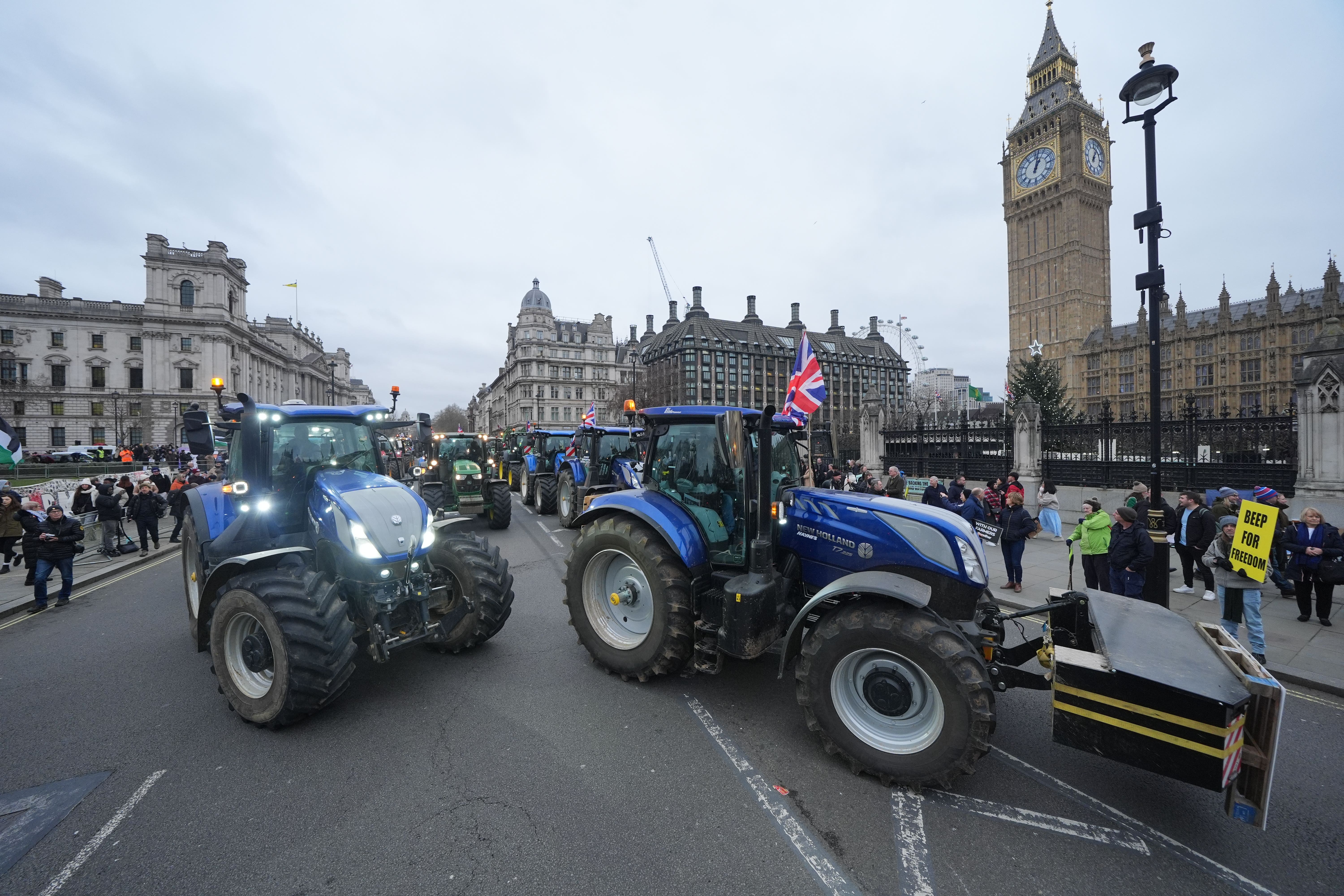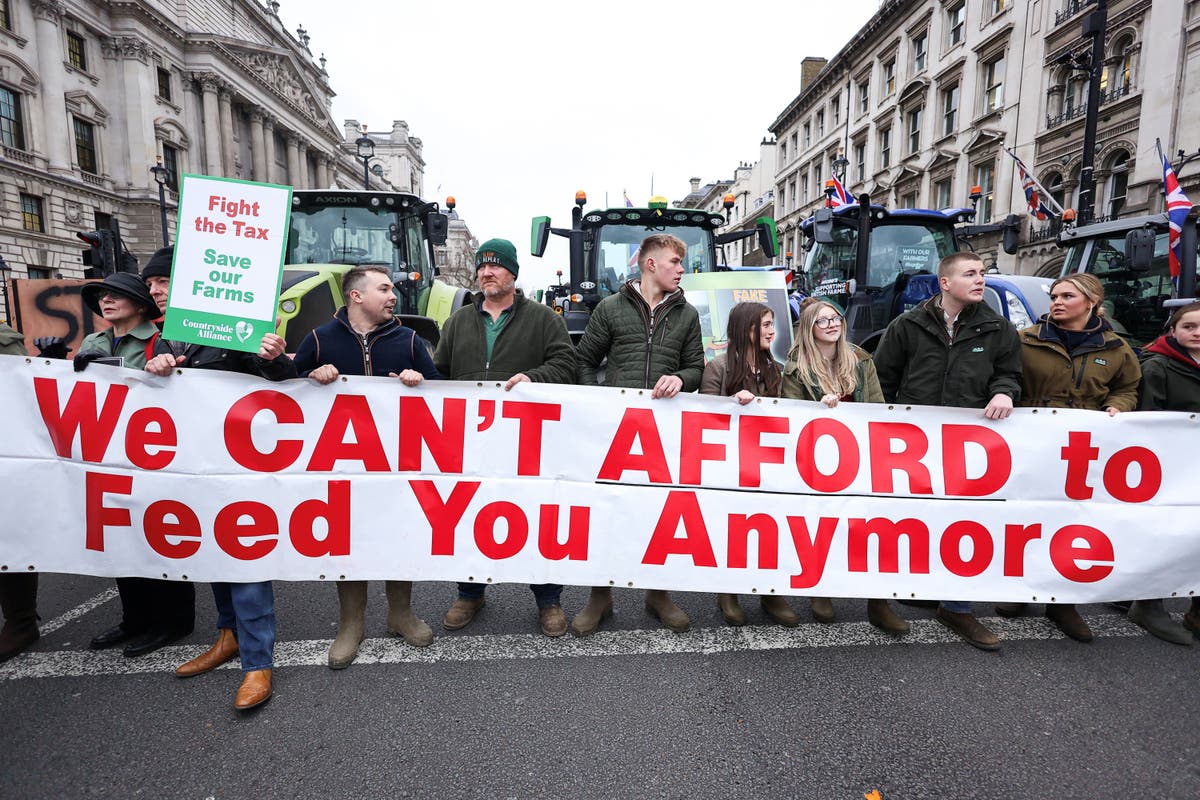The ‘tractor tax’ row has taken a dramatic new turn after a pro-Labour tax expert used by Keir Starmer to support the move called on him to U-turn.
Labour supporting tax campaigner Dan Neidle says the Budget decision to charge death tax on family farms worth over £1 million should be dumped in favour of a £20 million threshold.
It would remove at a stroke the threat of farmers who want to pass on their farms to their children being forced to sell up to pay a massive tax bill, said Mr Neidle. Instead the government should target rich landowners who use the current Inheritance Tax (IHT) exemption on farms as a tax dodge, he argued.
Insisting his “dramatic and simple” blueprint to end the row is “workable”, he said it was time for all concerned to do some “proper thinking” and ignore “the political noise”.

Mr Neidle’s intervention was hailed as a major breakthrough by farmers outraged by the levy announced by Chancellor Rachel Reeves last month.
National Farmers Union president Tom Bradshaw told The Independent: “Having seen one of the staunchest advocates for her tax change his mind, it would be nice to think the Chancellor and those who came up with this mess, will look again too.”
Mr Bradshaw praised Mr Neidle for his “willingness to look again at the impacts of this tax”.
He added: “Having done so, he saw that the policy is badly thought out, cripples family farms not tax avoiders and will have a devastating impact.”
Influential Mr Neidle was dragged into the “tractor tax” fiasco last month when he backed the government in a dispute over how many farmers would be hit by the new tax due to take effect in 2026.

In an article for the BBC, Mr Neidle said Ms Reeves’ claim that few farmers would be affected was “likely” to be true. Keir Starmer controversially seized on it as evidence that farmers who claimed far more would be affected were wrong.
Amid claims of political bias, the BBC was forced to drop its description of Mr Neidle in the article as an ‘independent tax expert.’
Mr Neidle makes no secret of his pro-Labour views and is a member of Labour’s national constitution committee that deals with Party discipline.
He has won praise in the past for investigations into tax fraud by his non profit making Tax Policy Associates group.
Under Mr Neidle’s new proposal, there would be a twenty-fold increase in the level at which IHT kicks in on farmers.
Instead of the £1 million in Ms Reeves’ Budget he says it should be £20 million – and that this would effectively save all family farms.
“With this change IHT would have no impact on a family farm succession planning, if the farmer’s heirs continue to own the farm,” he said.
“We’d be taxing farmers a lot less, but IHT-exemption-chasing investors a lot more. All in all, the revenue difference for the Treasury is likely (to be) small.
“The farmers and tax advisers I’ve spoken to think this is workable. The question is whether the current political noise creates any space for proper policy thinking. Let’s see.”
With more protests expected to follow scores of tractors descending on London last Wednesday, the justification for Ms Reeves’ extending inheritance tax to agricultural land in her Budget appears to be unravelling.
It comes as Labour MPs have privately told The Independent that they cannot understand why Labour picked a fight with farmers and rural communities for a tax which raises just £500m a year.
It is understood that a caucus of rural Labour MPs has already been set up to look for a way to persuade the government to back down.
In addition, the respected Institute for Fiscal Studies (IFS) think-tank gave evidence to the Commons environment, food and rural affairs committee in which it appeared to criticise the government’s proposals.
While the policy had been developed to stop wealthy people like entrepreneur Sir James Dyson using the loophole to avoid inheritance tax, David Sturrock of the IFS accepted it is “very likely that this change will affect family farms on any reasonable definition”.
In its report, the IFS said: “In some cases the farm will simply yield too little income (and the inheritor will have too few other resources) to pay the tax. The owners might choose, or be forced, to sell part or all of the farm. This is a feature of inheritance tax: the same applies to those inheriting a family home, for example.”
The Treasury has also come under fire for not carrying out an impact assessment into the effect of the policy while claiming it will only affect around 500 farms a year.
The NFU estimates that in reality it will be between 2,000 and 2,500 a year, which would mean that over 30 years as many as 70,000 farms could be impacted.
The NFU also seized on Department for Environment, Food and Rural Affairs (Defra) figures which suggested 60 per cent of farms could be hit. This is disputed by the government who described it as a ‘misreading’ which excluded tax allowances.
In its report the NFU stated: “Looking at sector impacts, the tax charge resulting from a £1m threshold would wipe out returns for an average cereals farm and around half of returns for average dairy farms. Considering typical historic returns on an average cereals farm and factoring in the reduction in direct payments, a farm making a profit of £34,000 will be hit with ten annual IHT installments of £53,000, over 1.5 times its profits. Even at a £2m threshold the annual tax payments of £33,000 would equal farm profits.”
The union also accused the Treasury of failing to take three key factors into account which has driven up the value of farms.
First, they have included claims on land parcels or non-commercial units which need to be stripped out to calculate the real number of farms affected. Second they only looked at agricultural property relief and not business property relief in their calculations. Finally, the NFU claims the government ignored the double digit percentage growth in agricultural land value since 2021/22.
This means that the Treasury claim that about 28 per cent of farms could be affected is wrong according to the NFU, who maintain it is closer to 75 per cent.
Mr Neidle, who denies he has changed his mind on the policy, told The Independent: “My figures changed downwards but the debate about the figures is a bit of a distraction in my view (and the NFU agree with that). The question is how the rules should work.
“I’m not asking the government to back down. I’m asking them to double down, and achieve their aim of stopping IHT avoidance more effectively. At the same time, that protects family farms. It’s win win.”
A Treasury spokesperson said: “Our commitment to farmers remains steadfast – we have committed £5 billion to the farming budget over two years, including more money than ever for sustainable food production, and we are developing a 25-year farming roadmap, focusing on how to make the sector more profitable in the decades to come.
“Our reform to Agricultural and Business Property Relief will impact around 500 estates a year. For these estates, inheritance tax will be at half the rate paid by others, with 10 years to pay the liability back interest free. This is a fair and balanced approach which fixes the public services we all rely on.”























+ There are no comments
Add yours